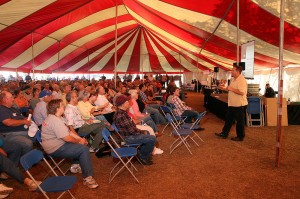 I thought it interesting that the last Adventist News Network is reporting that
I thought it interesting that the last Adventist News Network is reporting that
The revised Church Manual also introduces a glossary of frequently used terms, including a definition of “union of churches,” a church governance structure in which a group of local congregations reports directly to a union, eliminating the conference or mission level of administration. Delegates will approve several recently formed unions of churches at Session, as well as consider whether to expand the structure’s use.
As Samuele Thomas Sr. used to say when he preached…”Did you Get it? or Did You Miss it?”
Eliminating the Conference Level
Yes there seems to be talk about eliminating the conference level altogether. Now if you are a loyal reader of SabbathPulpit.Com, this would not have taken you by surprise. We talked about this four years ago in 2006. I discussed Harold Lee’s article on this page.
I talked about the annual council when this came up at this link. That article also has a pdf document of the different proposals for structural change.
In this article, I looked at 5 different options talked about in that document.
Finally, I talked about what structural change might mean for the regional (black) conferences at this link.
Well, it is here folks. There will be discussion about a so-called “union of Churches” which is simply a union conference. There is talk about eliminating the conference level.
Can We Afford Both Levels?
To be honest, I think that we can no longer afford nor do we need both the local conference and the union conference levels. It is a throwback to an earlier era. My only concern is that the members of the local church still retain its ability to affect and vote for its local leadership whether that be a “Union of Churches” or a “Conference.” This re-structuring cannot be a way to remove the ability of the member to participiate in the choosing of the direction of the local church and the level right above the local church.
But after having said that, there is a lot of duplicate leaders and offices that really need trimming. I mean do we really need a religious liberty director at the conference level? Don’t all the hard cases go up to the Union anyway? Do we really need the local conference Sabbath School leader? And if we do need both of them, how about a union leader and his staff, and then a conference leader and a regional conference leader if it is in the east. No we need restructuring.
I Hope This Is Not Simply A Power Grab
I suspect a lot of tentative decisions and discussions have taken place on this subject. It is my only hope that whatever happens, it will not amount to simply a power-grab by a few leaders, but it will be a principled decision for the good of our World Church by people at all levels of the church including the local conference and local church levels.





